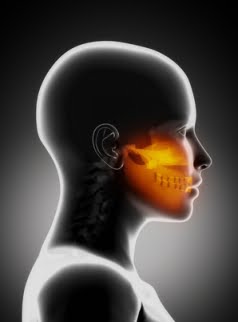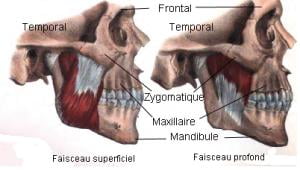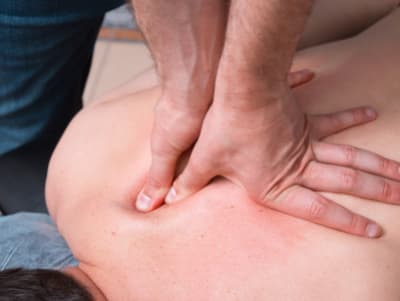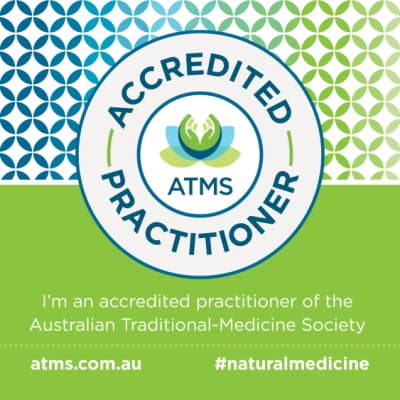Adelaide - Pasadena 5042

TMJ Symptoms (Temporomandibular Joint) / Pain and Jaw Problems
Have you been diagnosed with “TMJ”, TMJ syndrome / disorder, TMD, or do you think you could have problems with your jaw joints?
Did you know that most of these so called "TMJ symptoms" come from tense jaw muscles?
Maybe you don’t know that you have jaw joint problems or tense jaw or face muscles, but wonder where the following health issues come from?

- Ear and jaw pain in or around one or both ears (the jaw joint is underneath)
- Pressure in one or both ears (feeling of plugged ears or ear stuffiness)
- Ears popping
- Jaw clicking
- Restricted or locked jaw opening
- Bite (occlusal) problems
- Headaches
- Neck or shoulder pain (or all over body pain)
What is a TMJ syndrome?
“TMJ” is the abbreviation for tempromandibular joint, which is your jaw joint. The jaw joints are located around your ears. They are said to be the most complicated joints in the body because of their complex construction and therefore functionality.
It doesn’t take much to throw this complex equilibrium out of balance and cause the so called TMJ syndrome or disorder. The jaw joints are so sensitive that they even react to a poor posture.
Once they are out of balance, misaligned jaw joints can in turn be responsible for muscular pain elsewhere in your body.
This is because TMJ misalignment causes contractions (=trigger points) in your jaw and face muscles, which then can cause dysfunctional neck muscles. These in turn may impact your shoulder and hip muscles, till finally you feel pain all over your body - without connecting any of it to your TMJs.
Possible Causes of TMJ symptoms
There are many possible causes of tense or disbalanced jaw muscles, any of which may be responsible for the above-mentioned TMJ symptoms. Some of the most common causes are
- a dentist visit with long periods of mouth opening,
- an underdeveloped or misaligned bite,
- biting on one side only for a long period of time,
- teeth grinding (bruxism,)
- wearing a splint, night/bite guard or braces,
- jaw dislocation,
- sleeping on your stomach,
- neck trauma,
- a car accident / whiplash,
- poor posture (can be caused by muscular or structural imbalances),
- slouching and slumping,
- tight shoulder and neck muscles,
- a magnesium deficiency,
- hypermobile joints,
- a connective tissue disorder,
- Fibromyalgia.
Often a combination of these may lead to so-called "TMJ symptoms".
Myofascial Pain
An underdiagnosed cause of TMJ symptoms
“Myofascial Pain” refers to pain that emanates from muscles and/or the surrounding connective tissue, the fascia. This is typically an overlooked and under-diagnosed cause of general body pain or stiffness, or pain that seems to come directly from your TMJ.
To be precise, this type of muscle pain comes from contracted muscle fibers, which are medically known as “trigger points”.

Other symptoms of tight jaw muscles
Once your jaw muscles are tight and have developed these trigger points, you might be aware of one or more of the following problems, many of which are not usually connected to tense muscles:
- difficulty swallowing
- tooth pain
- tongue pain or burning
- premature tooth contact
- throat pain
- dizziness
- cracking neck
and more
TMJ Pain Relief at ToThePoint Massage
Regardless of the possible causes of your TMJ problems, massage to your mouth, face, neck, shoulder and / or postural muscles may bring considerable relief to your TMJ symptoms.
Barbara, the massage therapist at ToThePoint Massage has had personal experience with TMJ problems, and can testify to the effectiveness of massage therapy.
She also holds a diploma in Myotherapies (a therapy which treats pain coming from trigger points in muscles and fascial constrictions).
Watch a video about the connections between TMJ symptoms and myofascial pain:
Further Readings
Masseter image - ©Berichard (travail personnel d'après Atlas de Bonamy 1854) [GFDL (www.gnu.org/copyleft/fdl.html) or CC-BY-SA-3.0-2.5-2.0-1.0 (www.creativecommons.org/licenses/by-sa/3.0)], via Wikimedia Commons
References:
www.nidcr.nih.gov/research/ResearchResults/InterviewsOHR/TIS012006.htm
www.nidcr.nih.gov/oralhealth/Topics/TMJ/TMJDisorders.htm



